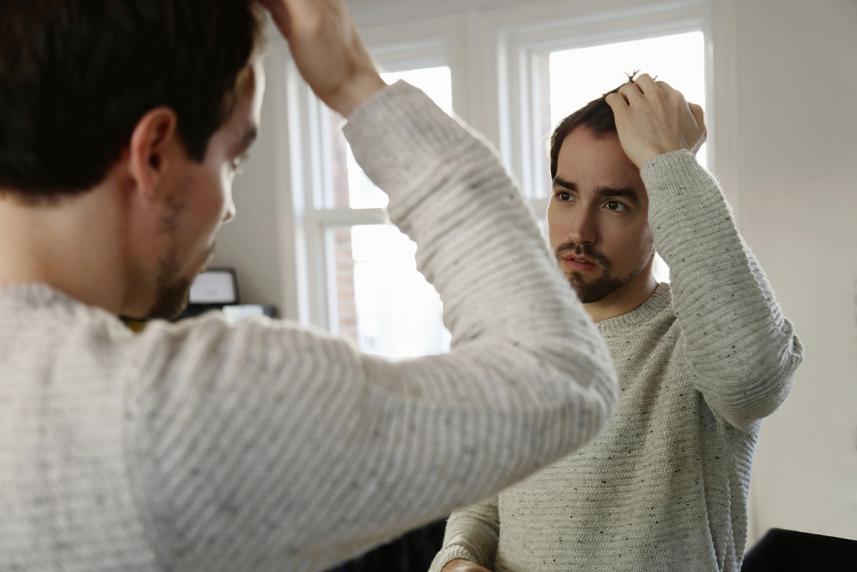
Get discreet care from the comfort of home. No appointments are required and medication can be delivered straight to your door. Plus, we're open 24/7.

Getting help right away is important. But before starting a hair loss medicine or supplement, consider these factors — so that you can understand the best next steps for you.
The minute you notice hair loss, you want a solution. Fast. So you go online and find an array of hair loss medications available with a click. Or perhaps you head to your local drugstore to see the hair loss supplements and products lining the shelves.
Before you grab your car keys or click “add to my cart,” press pause. It’s a good idea to educate yourself about hair loss first so you don’t waste time or money with the wrong approach. You’ll also want to get expert input to make sure you end up with the treatment that’s best for your particular issue.
Here, the 5 things you should know before trying a hair loss solution.
While you don’t want to pull the trigger on a specific treatment without research or a doctor’s input, you also don’t want to wait too long. Preserving the hair that’s still there is key. “It’s much easier to retain hair than to regrow it,” says Stephanie Cotell, MD. She’s a dermatologist at Northeast Dermatology and Cosmetic Surgery Center in Gahanna, Ohio.
The best way to hold on to what you’ve got is to seek early intervention. If you’re concerned about thinning hair, a receding hairline, a widening parting or increased amounts of hair coming off in your brush or in the shower, don’t wait to get expert help.
A general practitioner can be a great first step, as they see some patients with hair loss. But you may also want to consider a dermatologist. “A dermatologist can find out the cause so an appropriate treatment can be started,” says Dr. Cotell. Dermatologists are experts on hair, skin and nails, and they see a lot of cases of hair loss. This is key, because some hair loss problems, if left untreated, can lead to permanent hair loss.
Plus, you’ll be seeing a specialist who understands the emotional impact. “Hair loss is so distressing for patients,” says Dr. Cotell, and the sooner a person gets the right diagnosis, the quicker they can ease that distress. Dermatologists can be the people you talk to frankly, not just about your symptoms but also about how hair loss is affecting your life.
“Often women will come see us and won’t have talked to other people about it yet. They might not have even talked to their friends about it,” says Susan Huang, MD, a board-certified dermatologist in Irvine, California.
All doctors should look at your overall health, and hair loss may point to underlying health problems such as a thyroid issue or nutrient imbalances. These conditions need to be addressed as soon as possible. (You may need a physical exam, a biopsy or other tests.)

Get discreet care from the comfort of home. No appointments are required and medication can be delivered straight to your door. Plus, we're open 24/7.
Female-pattern or male-pattern baldness is the most common form of hair loss, but there can be other causes. (Read Hair Loss: The Optum Guide to learn more about what can lead to hair loss.) Some types of hair loss — such as telogen effluvium, which people can experience after a traumatic event such as surgery, an illness or childbirth — ultimately resolve on their own.
Other forms are slow to develop and are determined by hormones and genetics. Still others are caused by inflammation or immune disorders and can destroy the ability of sections of the scalp to grow hair at all. But there’s no need to panic, especially before visiting your dermatologist. It’s helpful to understand that hair loss can have an array of causes — and different versions require different treatments.
Finasteride — known by the brand name Propecia® — has slowed hair loss in up to 80% to 90% of men who take it. But there’s a “black box warning” on it, which means the U.S. Food and Drug Administration requires a warning on the label to highlight serious or life-threatening risks. The prescription pill is not recommended for women, especially those of child-bearing age, because of the risk of birth defects. Plus, there’s not enough research yet to show whether it’s as safe for women as it is for men.
There are also certain conditions that affect women but not men, such as polycystic ovarian syndrome and post-menopausal hair loss. Learn more about hair loss and women here.
Minoxidil was developed in the 1970s as a treatment for hypertension, and now it’s a safe and effective over-the-counter treatment for hair loss in both men and women. We’ve moved on from the early days of unsightly hair plugs to hair transplants with natural-looking results. New treatments such as laser therapy are being developed and improved to stimulate hair growth. That said, it’s important to understand that treatment can take months before you see results. And you may need to try several different treatments before you find the one that works for you.
There is help for hair loss. By acting early, seeking the right kind of help, understanding the different factors that can affect treatment, and exploring the range of available options, you can get the support and answers you need.
The Optum Store provides total care for your body and mind. Refill medications, schedule a virtual visit, or shop for health essentials all from the comfort of home. Get started.
Additional sources
Women and finasteride: Drug Design, Development and Therapy (2020). “Finasteride and its Potential for the Treatment of Female Pattern Hair Loss”
PCOS and hair loss: The Journal of Clinical Endocrinology and Metabolism (2019). “Female Pattern Hair Loss and Androgen Excess”
Laser treatments: Lasers in Surgery and Medicine (2013). “Low Level Laser (Light) Therapy (LLLT) for Treatment of Hair”